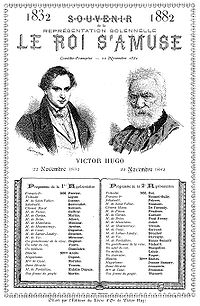Le roi samuse
by Victor Hugo
The action takes place in Paris in an unspecified year in the 1520s.
The first act is set during a nocturnal party at the Louvre palace; the second in the deserted cul-de-sac Bussy; the third in an antechamber of the King at the Louvre, then the fourth and fifth acts on the banks of the river Seine by the Château de la Tournelle.
The hero of the play, Triboulet, is a historical character during the reigns of Louis XII and François I of France. Triboulet is a court jester, through whose words Hugo attacks contemporary society. The king is a profligate and a womanizer, constantly looking for new conquests. Having set his sights on a new mistress, the Countess de Cossé, Triboulet encourages the king to kill her husband. Triboulet is despised by the courtiers, who plot to abduct the young woman living with him whom they assume is his mistress. The sudden appearance of the Comte de Saint-Vallier, the father of Diana de Poitiers, seduced by the king, to demand compensation from the monarch, leads the king and Triboulet to mock him, upon which the aristocrat curses them.
Returning home, Triboulet cannot put the curse out of his mind. He meets a stranger on the street, Saltabadil, who offers his services to right the jester's wrongs. Triboulet declines and goes back to the house where he conceals from the world his daughter Blanche. Knowing the character of the king and the nobility, he wants to protect her from seduction and only lets her out to attend mass. Blanche is pleased to receive a visit from her father but does not tell him that she has fallen in love with an unknown man who has seen her in church. Hearing noises in the street Triboulet rushes out to investigate, at which point the king enters the house in disguise; he and Blanche profess their love. The king leaves again, but in the street the jester encounters a group of courtiers. They claim that, in accordance with the earlier plan of the jester they want to abduct Madame de Cossé. In fact, they have come after Blanche whom they believe to be Triboulet's mistress. This is to be the revenge of the courtiers on the jester. They trick him into wearing a mask blindfold and run off with the girl. When he hears her voice in the distance he realises what has happened.
The next day the courtiers prevent Triboulet from entering the room in which Blanche is with the king. When she emerges she tells her father the whole story, which makes the jester determined to take revenge. As Saint-Vallier is taken to his execution Triboulet replies that the curse will soon act on the king. He goes to Saltabadil at an inn by the Seine and pays half the money for the murder. The king also arrives at the inn, where he waits for Maguelonne, the assassin's sister. When the monarch goes to sleep, Saltabadil plans to deal the fatal blow, but Maguelonne asks him to spare the man who has charmed her and instead to kill a random stranger and give that body to the jester. Blanche overhears and can see that the king is unfaithful but decides to save him by sacrificing herself. She enters and is mortally wounded.
In the final act, it is midnight and a storm is passing. Triboulet returns to collect his prize in a sack and refuses Saltabadil's offer to help him throw it in the river, but just as he is about to do so, he hears the king's voice singing and realizes he has been duped. As lightning flashes, he opens the sack and sees that the body in it is his daughter; after asking forgiveness of him, she dies. A crowd is attracted by Triboulet's cries and believes he has killed someone, but a woman stops them from taking him away. A doctor also arrives at the scene and pronounces Blanche dead. Triboulet collapses, exclaiming "J'ai tué mon enfant!" ("I have killed my child!").
